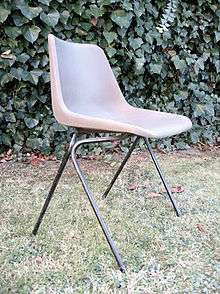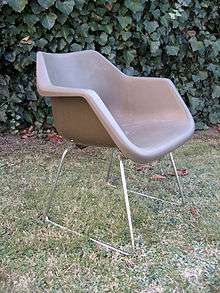Hille (furniture)


Hille [1] is a British furniture manufacturer, particularly of modernist chairs.
History
The company was founded in 1906 by Salamon Hille in London's East End.[2]
The Hille furniture business was transformed when Salomon's daughter Rosalind Julius and her husband met two award winning British designers in America in 1949. Historically the business had created reproduction antiques and during the war it had repaired antique furniture for the Victoria and Albert Museum. It could not compete in the new furniture market even after the war with the government's Utility furniture scheme. The business was temporarily saved at the end of the war by exporting Chippendale style furniture to America. The two designers, Robin Day and Clive Latimer, had won prizes for furniture design from the New York Museum of Modern Art. Together the company changed direction and the new furniture was designed not for retail but for specification by architects and large projects. They were awarded the contract to deliver furniture for the Festival Hall.[3]
Robin Day designed a novel chair name Hillestak which used laminated wood and the stackable chairs became popular for public buildings.[3]
The partnership with Robin Day was very successful and in 1952 the Hille company set up showrooms in Mayfair where their modernist furniture could be displayed. Here they could host architects and interior designers. They won important contracts to supply prestige offices in London and the contractfor the furniture for, what would become, Heathrow Airport. By 1953 they had five showrooms in Britain and another in Grenoble. In 1958 they designed the furniture for Gatwick Airport. The company continued to support British design and in 1963 Day designed another important chair this time in Polypropylene. The Polyprop, which Day designed for Hille, has become a modern design classic, celebrated with a postage stamp. It is the world's best-selling chair.[4] This Polyprop chair would sell in millions.
Fred Scott designed the Supporto seating system in 1979. Meanwhile, they won contracts for British embassies, the Istanbul Hilton and the Unesco building in Paris. Their successful British designs were licensed overseas including the rights to manufacture tens of thousands of chairs for the Mexico Olympics.[3]
The family stopped being involved in furniture in 1983 when they sold the business. Harry Julius died in 1989.
References
- ↑ Pronounced HIL-i (rhymes with "silly")
- ↑ "History of Hille". Hille. Retrieved 26 September 2015.
- 1 2 3 Richard Snell, ‘Julius , Rosamind (1923–2010)’, Oxford Dictionary of National Biography, Oxford University Press, Jan 2014 accessed 24 Sept 2015
- ↑ "The people's chair". The Guardian. 13 March 1999. Retrieved 26 September 2015.